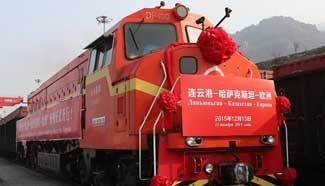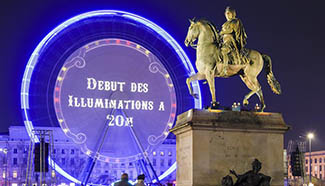ALEPPO, Syria, Dec. 9 (Xinhua) -- "We were living in hell, and nothing could be worse than our lives back under the rebel control," a fleeing resident of rebel-held areas in eastern Aleppo city said Friday, after arriving in government-controlled areas.
Omar Qulleh, a father of four, had lived under the rebel control for four years. He said his life had gotten worse in the last six months, when the rebel-held areas were put under a siege by the Syrian army.
He said the situation before the siege was bad, and it got worse.
"We have endured unimaginable injustice and starvation but we were patients," he told Xinhua, after arriving at a temporary displacement center in the town of Jibreen, south of Aleppo.
Qulleh is one of thousands of people who have fled eastern Aleppo over the past two weeks, when the army mounted a major offensive to drive out the rebels from the city.
The army forces backed by Shiite fighters and Russian airstrikes have become in control of over 85 percent of eastern Aleppo, after placing a months-old siege on that part of the city.
The military offensive came after the rebels refused several calls to leave the city peacefully.
HUNGER FOR BREAD
Qulleh spoke of the tough situation in eastern Aleppo ahead of his departure.
Before the siege, every thing was so expensive in eastern Aleppo, as the rebels would bring in the goods from the Castello road in the northern countryside of Aleppo, mainly from Turkey.
But following the Syrian army's capture of Castello, eastern Aleppo has gone under siege.
The 50-year-old man said the rebels started depriving people from basic food items, like bread, while keeping it for themselves.
"The rebels would give us a few loafs of bread every two days. My little son used to wake up everyday crying of hunger. He would tell me 'I want bread, I am hungry.'"
His wife, Amira, was sitting next to him on a thin mat just outside a dorm-like venue where hundreds of families sleep during the night.
Pale and sick, the women stuttered while remembering how their lives were just two days ago.
Being a mother of four, two of whom are sick, Amira bitterly recalled the helplessness and the agony she had lived for months while her children were crying of hunger and paling into sickness due to the lack of food and medicine.
"Only God knows how we managed to survive with all the sickness, and weariness as well as lack of everything. The rebels used to torture us. They would refuse to give us bread, even though they have had it in their storages."
FEAR TACTICS
When the rebels took over eastern Aleppo in 2012, few had left to government-controlled areas, mainly those who have had enough money to live in dignity, but for poor people like Qulleh, it wasn't the case, as him staying at his home was the only dignified option.
But as the situation got worse and the siege tightened on their areas, he said he wanted to leave but the rebels wouldn't let them, particularly after the government made several appeals for allowing the civilians out of eastern Aleppo.
"They would scare us from fleeing to the government side, they would tell us that the Syrian soldiers would slaughter us and we were actually scared of that because we have been living under the rebel control for four years and we have had no idea how the government would deal with us."
His wife also spoke of the scaring tactics the rebels would follow to keep the civilians from leaving eastern Aleppo.
"When we tell them we wanted to leave, they would accuse us of wanting to go and living under the rule of a tyrant... they said the army will kill you."
But she and her husband said such fears have faded away when the rebels retreated from their neighborhood of Salihin, that's when they decided to leave, at least for the time being.
LIFE IN SHELTERS
All of those who have fled eastern Aleppo were brought to temporary shelters in the countryside of Aleppo.
The one in Jibreen, which was previously a large government facility for storing cotton, is the main one.
Several civil society charities set up booths inside the camp to help those who are in need for medical help.
The Russians also established a field hospital in that camp, offering treatment for the evacuees.
In the middle of a big yard inside the camp, there is a military tank playing music hailing President Bashar al-Assad and the Syrian army.
All of the civilians who fled eastern Aleppo have been brought into the camp by government busses from crossings between western and eastern Aleppo.
The authorities at the camp gave them Syrian flag-colored hats, as the rebels uses another flag.
The situation in the camp is miserable, but for those coming from the "other world," it was like heaven.
"Here, we have been received properly and given food and mattress, and we are so happy now. It turns out the rebels were lying and the army forces didn't slaughter us after all," Amira said.
Officials in the camp said the civilians will return to their homes after the areas that had been under the rebel control are completely clean of explosives and after the infrastructure is slightly repaired.
Alaa Addien Qasab, an official with the Aleppo Relief Committee, told Xinhua at the Jibreen shelter that nearly 5,000 civilians arrived to the shelter in batches on Friday.
He said that nearly 15,000 people have arrived in the shelter since last week, adding that the civilians who are arriving are being later transported into more adequate shelters or to their relative in the government-controlled areas in the western part of Aleppo.
Qasab said that the Syrian government treats all of the Aleppo people equally whether they are from western or eastern Aleppo, adding that government is working to secure the needs of the civilians.










